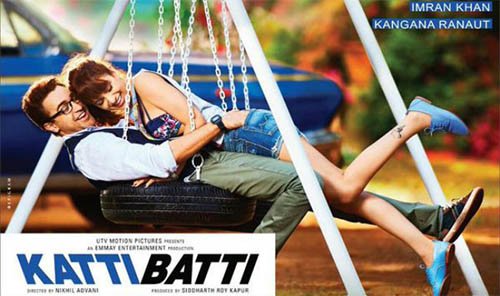Producers Move Show Timings Online
Here's the latest update from the world of Bollywood. We bet you wouldn't want to miss this. Read on for details... Less dependence on print

Have you noticed how film ads in newspapers don't mention the show timings anymore? Well, that's because The Film And Television Producers Guild of India has decided to spend money wisely and move online. Print ads with show timings, they say, are not attracting footfalls in cinemas like they used to.
Mukesh Bhatt, the president of the guild, explains, "We have decided that only some show timings will be displayed in the papers in big cities; the rest will move online. Technology has evolved and this change is inevitable. Haven't emails made post offices redundant? These days, almost everyone has a smart phone, and most tickets are booked online. Then why spend money in an area where there are few consumers?"

Most of the recent releases, including Katti Batti, Timeout, Calendar Girls and Kis Kisko Pyaar Karoon, have followed the practice.

Says Amar Butala, the CEO of Salman Khan Films, which recently released Hero, "Everyone has slowly moved online, and it's a healthy change. It not only helps digitally well-versed urban and semi-urban audience, but also the producers. For print ads, show timings have to be sent two or three days earlier and no last-minute changes are possible. On digital platforms, there are no such restrictions."
In the coming days, more producers -- Siddharth Roy Kapur, Vikram Malhotra, Nikhil Advani, Karan Johar, Ekta Kapoor, Ashutosh Gowariker and Farhan Akhtar, to name a few -- will be seen following suit. "As a young producer, I understand that if there are more customers online, I must cater to them there," says Nikhil.
Even old-school producers like Boney Kapoor and Ramesh Taurani have supported the move, though the latter has insisted that it should not be forced on anyone.
As Vikram points out, "As a producer, I love this directive. An increasing number of moviegoers are booking tickets online. So, instead of investing in print ads with show timings, I can spend that money on more productive marketing schemes. It's one of the wisest decisions made by the guild."
However, there are concerns about theatre owners -- especially those of single screens -- getting affected by the move. While multiplexes have a strong presence on digital platforms, such is not the case with single screens. Also, if it affects footfalls, chances of a hike in ticket prices cannot be ruled out.
Manoj Desai, executive director of Maratha Mandir and G7 single-screen chain, is unhappy with the move, but for different reasons. He says, "The producers are making a huge mistake. If 60 per cent people are using online platforms, does it mean they will ignore the remaining 40 per cent? Also, we don't have wifi everywhere. It's not going to affect theatres like ours where show timings haven't changed for years. But it will affect single screens in areas where the Internet is still alien compared to newspapers. Though ticket pricing won't be affected soon, who knows aage kya hoga?"
Multiplex owners, on the other hand, are unrattled. Also, many of them place print ads on their own. Anand Vishal of Fun Cinemas says, "It may help to place newspaper ads on the release weekend. But after that, there's no reason to continue with them. Nowadays, footfall is less anyway, unless it's a big-ticket film."
Rajesh Makhija, Assistant Vice President, marketing and sales, Carnival Cinemas, agrees, while saying, "Print has its charm, but online is more useful to us now. Sudden changes can be reflected easily on websites and apps, but we can't do that in print. When Katti Batti didn't do well, we replaced it with another film. And our patrons were not disappointed as the changes were instantly reflected online. Moneywise, it works well for us."
Image Source: Manav Manglani
Mukesh Bhatt, the president of the guild, explains, "We have decided that only some show timings will be displayed in the papers in big cities; the rest will move online. Technology has evolved and this change is inevitable. Haven't emails made post offices redundant? These days, almost everyone has a smart phone, and most tickets are booked online. Then why spend money in an area where there are few consumers?"

Most of the recent releases, including Katti Batti, Timeout, Calendar Girls and Kis Kisko Pyaar Karoon, have followed the practice.

Says Amar Butala, the CEO of Salman Khan Films, which recently released Hero, "Everyone has slowly moved online, and it's a healthy change. It not only helps digitally well-versed urban and semi-urban audience, but also the producers. For print ads, show timings have to be sent two or three days earlier and no last-minute changes are possible. On digital platforms, there are no such restrictions."
In the coming days, more producers -- Siddharth Roy Kapur, Vikram Malhotra, Nikhil Advani, Karan Johar, Ekta Kapoor, Ashutosh Gowariker and Farhan Akhtar, to name a few -- will be seen following suit. "As a young producer, I understand that if there are more customers online, I must cater to them there," says Nikhil.
Even old-school producers like Boney Kapoor and Ramesh Taurani have supported the move, though the latter has insisted that it should not be forced on anyone.
As Vikram points out, "As a producer, I love this directive. An increasing number of moviegoers are booking tickets online. So, instead of investing in print ads with show timings, I can spend that money on more productive marketing schemes. It's one of the wisest decisions made by the guild."
However, there are concerns about theatre owners -- especially those of single screens -- getting affected by the move. While multiplexes have a strong presence on digital platforms, such is not the case with single screens. Also, if it affects footfalls, chances of a hike in ticket prices cannot be ruled out.
Manoj Desai, executive director of Maratha Mandir and G7 single-screen chain, is unhappy with the move, but for different reasons. He says, "The producers are making a huge mistake. If 60 per cent people are using online platforms, does it mean they will ignore the remaining 40 per cent? Also, we don't have wifi everywhere. It's not going to affect theatres like ours where show timings haven't changed for years. But it will affect single screens in areas where the Internet is still alien compared to newspapers. Though ticket pricing won't be affected soon, who knows aage kya hoga?"
Multiplex owners, on the other hand, are unrattled. Also, many of them place print ads on their own. Anand Vishal of Fun Cinemas says, "It may help to place newspaper ads on the release weekend. But after that, there's no reason to continue with them. Nowadays, footfall is less anyway, unless it's a big-ticket film."
Rajesh Makhija, Assistant Vice President, marketing and sales, Carnival Cinemas, agrees, while saying, "Print has its charm, but online is more useful to us now. Sudden changes can be reflected easily on websites and apps, but we can't do that in print. When Katti Batti didn't do well, we replaced it with another film. And our patrons were not disappointed as the changes were instantly reflected online. Moneywise, it works well for us."
Image Source: Manav Manglani
_2024-12-23-5-53-49_small.jpg)


_2024-12-23-10-10-26_small.jpg)